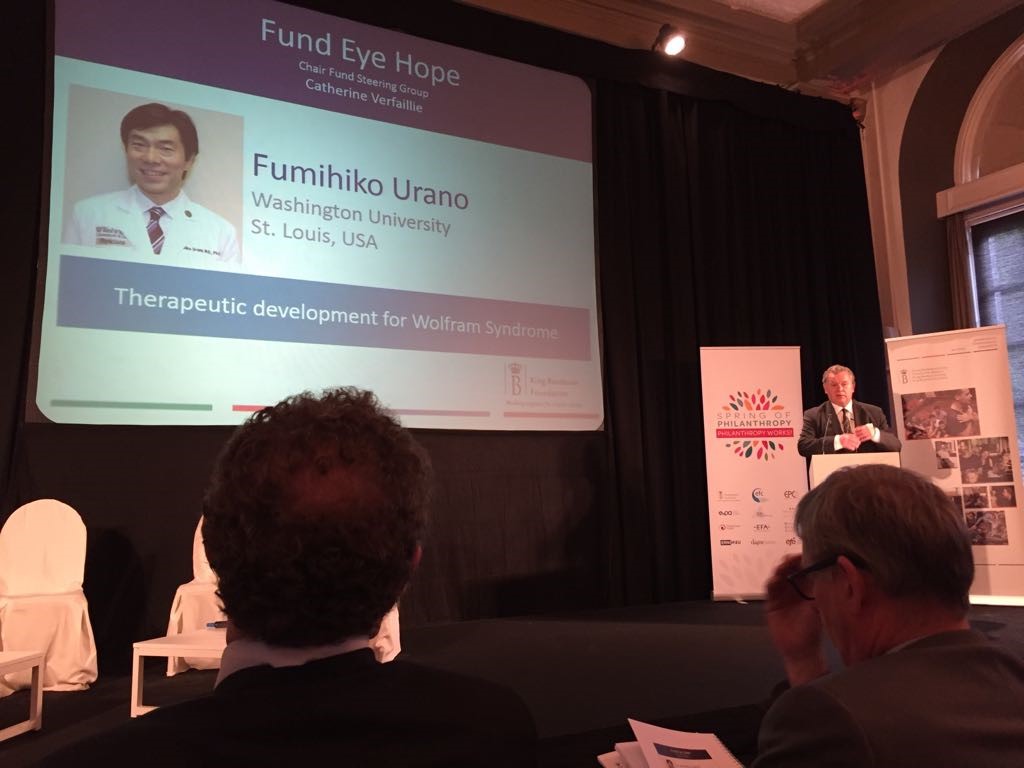Eye Hope Foundation has celebrated its first anniversary this summer. Time to reflect back on our achievements in the past year.
As you have seen on our website, we have had many events in the past year en we will have many more in de months and years to come! Both the number of events as the amount of money they all raised are above the expectations we had in mind at the start of this initiative. So we would like to thank every single person who organised, helped or participated in one way or an other at these events. The funds that were collected have been fully spend on research toward Wolfram Syndrome.
Our Wolfram-journey really started by attending the Wolfram conference that was organized by the French Wolfram Association in Vannes in June 2016. There, the most prominent Wolfram researchers gave a status on their work. Most promising from the conference was the announcement of two clinical trials. One on Dantrolene that is currently ongoing at Washington University and the other on Sodium Valproate, soon to be started at Birmingham hospital. Both clinical trials are testing the use of already existing medicines with the aim to slow down the progress of the disease. Because those medicines have allready been approved for human consumption, the time course from bench to patient is severely reduced as to when a new molecule is to be developed.
With the understanding from the conference and published literature in the fields, we have used our funds completely towards initiating research projects in Belgium as well as abroad. A short summary is given below:
- In Leuven, the team of Prof. L. Moons has obtained mice that were infected with Wolfram Syndrome from an Estonian group. The mice have gone through several screenings and were then cultured to produce an offspring. This is a necessary step to obtain a statistical relevant group of mice with mutations in both alleles. Possible treatements are tested on mice with and without Wolfram syndrome so the scientists can compare those mice to mice that did not receive the treatment.

Figure 1: the team at the KU Leuven (Jessie Van Houcke, Lies De Groef and Lieve Moons)

Figure 2: On the left a cage with normal «wild-type» mice and on the right a cage with WFS1-type mice
- In Brussels, a team led by Prof. M. Esteve, started testing the compound GLP-1 agonist on cell level. They compared normal cells and cells with reduced Wolframin production (like in people suffering from Wolfram Syndrome) and treated those with several GLP1 agonist. Initial results are promising. Furthermore, the team has been collaborating with other research groups to obtain stem cells from Wolfram patients.

Figure 3: M. Esteve at the ULB
Furthermore, both teams at the KUL and the ULB have done common testing where GLP1 pumps have been implanted in the Wolfram mice. Initial results are expected after summer.
Eye Hope Foundation is proud to have initiated research on Wolfram Syndrome in Belgium and we will continue to support those researchers.
- Besides the two teams in Belgium, Eye Hope Foundation has also sponsored projects at Washington University (Prof. F. Urano) on the JTV519 mini-molecule and at the French Group of Montpellier (Prof. C. Hamel) on Gene Therapy.

Figure 4: Recognition of Eye Hope Foundation by the Koning Boudewijn Stichting
- Finally, the foundation has been a driving force behind a common call for projects, where three leading Wolfram patient organizations (the Snow Foundation, the Association syndrome de Wolfram and Eye Hope Foundation) have committed into the funding of one project over the next two years. Six projects were obtained among which a top research project of a Belgian group. After carefull review, the group of Birmingham (Prof. T. Barrett) has been selected to find reliable biomarkers for potential drugs against Wolfram.
We look back at this first year with a happy feeling. The progress and results are hopefull. We are collaborating with all Wolfram researchers and have attracted attention of other research groups towards this field. We have laid the fundaments in Belgium to foster research towards a cure. We possess today a cell model as well as an animal model of the syndrome. First trials on those with potential treatments are furthermore promising.
Other projects run in parallel elsewhere in the world, and we will continuously evaluate them for potential funding in the years to come.
Despite this good start and our happy feeling after this first year, we realise that our work has only just begun. A treatment looks possible within some years but is still far from a cure, at its best it will slow down the progression of the disease.
We are living on hope but we need more funding, a lot of funding to find a cure for Wolfram Syndrome! We will keep on fighting, but we will also need your help doing so into the future!
Thanks again to all of you (sponsors, organizers, researchers, volunteers and event participants) who are supporting us during our life-long project for Victor, Bertha and all other Wolfram patients!

September 2017
Lode Carnel
